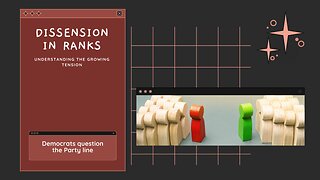Premium Only Content

Jackson rewrites the Constitution
Jackson rewrites the Constitution
By Terry A. Hurlbut
The Supreme Court of the United States opened its 2022 Term this week. On Tuesday (October 4), the Court heard oral argument on two cases. The more important of the two is a consolidated case, involving redistricting in Alabama. And in that argument, Justice Ketanji Brown Jackson clearly showed her intent to rewrite the Constitution, and history. She can only be doing this, furthermore, in furtherance of Critical Race Theory.
The case at issue
The case, or rather, two cases, are Merrill v. Milligan (21-1086) and Merrill v. Caster (21-1087). In them, John H. Merrill, Alabama’s Secretary of State, is defending a new House of Representatives district map that the legislature drew. Two different activists, named Evan Milligan and Marcus Caster, sued the State and demanded that a court substitute their district maps.
Alabama’s legislature drew those districts in a race-neutral manner. That is, they enforced no preference for members of any given race being shoo-ins for election from any given district. That wasn’t good enough for Messrs. Milligan and Caster. They want proportional representation of whites and blacks in Congress from their State. To do that, they insist on drawing a map so that, if 27 percent of the State’s residents are black, so also will be a quarter of its U.S. House delegation.
Long-time readers of CNAV will recognize at once the folly of the argument by Milligan and Caster. Legislative districts should be about neighborly relationships, not what proportion of the population has skin of any particular color. In addition, there is only one race: the human race. Milligan and Caster might as well ask the State to:
1. Apportion House seats explicitly according to race, and then
2. Hold at-large elections among whites and blacks to choose white and black candidates to fill the slots.
Proportional representation by race
Indeed, the organization called FairVote proposes something very like it. But at least their proposal would let you choose where to align. You would vote for the Republican Party or the Democratic Party—two candidates for Speaker of the House. Then the Secretary of State would apportion Congressional slots in proportion to each Party’s showing in a State-wide vote. That is how they do things in many European countries, and in the State of Israel. (And past contributors to CNAV, residents of Israel, have railed against such proportional representation and argued for single-member district. Single-member district representatives are accountable to their neighbors. Proportionally assigned slot holders are not.)
But Milligan and Caster want to go further even than that. They want to align people by race. And when they can’t get their State to change its Constitution to send people to the House of Representatives in such a manner, they do the next best thing. They lobbied for the Voting Rights Act, which mandates the drawing of districts to achieve proportional representation by race.
And that violates the Fourteenth Amendment. The Fourteenth Amendment says in relevant part:
No State shall make or enforce any law which shall abridge the privileges or immunities of citizens of the United States; nor shall any State … deny to any person within its jurisdiction the equal protection of the laws.
Edmund Lacour, Alabama Solicitor General, stepped up on Tuesday to argue that. And that is when Ketanji Brown Jackson completely botched the Fourteenth Amendment.
How Justice Jackson got it wrong
The Supreme Court’s Web site has the transcript of the oral argument.
Beginning on page 52, Justice Amy Coney Barrett questions Mr. Lacour on the dual considerations he faces. First she acknowledges that Alabama would not have two “majority-minority” districts without a deliberate attempt to account for race. Then she makes sure she infers correctly,l from Mr. Lacour’s argument, that:
If you were forced to adopt a map proposed by the plaintiffs that was racially gerrymandered because race was predominant in its drawing, that you would be violating the Fourteenth Amendment.
Mr. Lacour answers, “Yes.” He further denies that the federal government has any “compelling interest” in such proportional representation by race.
Then, beginning on Page 57, Justice Jackson twists the Fourteenth Amendment beyond any semblance of its original meaning.
Jackson holds that the Fourteenth Amendment was not a race-neutral provision
Why, given our normal assessment of the Constitution, why is it that you think that there's a Fourteenth Amendment problem?
And let me just clarify what I mean by that. I don't think we can assume that just because race is taken into account that that necessarily creates an equal protection problem, because I understood that we looked at the history and traditions of the Constitution at what the framers and the founders thought about and when I drilled down to that level of analysis, it became clear to me that the framers themselves adopted the equal protection clause, the Fourteenth Amendment, the Fifteenth Amendment, in a race conscious way. That they were, in fact, trying to ensure that people who had been discriminated against, the freedmen in – during the reconstructive – reconstruction period were actually brought equal to everyone else in the society.
So I looked at the report that was submitted by the Joint Committee on Reconstruction, which drafted the Fourteenth Amendment, and that report says that the entire point of the amendment was to secure rights of the freed former slaves. The legislator who introduced that amendment said that “unless the Constitution should restrain them, those states will all, I fear, keep up this discrimination and crush to death the hated freedmen.”
Jackson says the Civil Rights Act of 1866 was not race-neutral, either
That's not – that's not a race-neutral or race-blind idea in terms of the remedy. And – and even more than that, I don't think that the historical record establishes that the founders believed that race neutrality or race blindness was required, right? They drafted the Civil Rights Act of 1866, which specifically stated that citizens would have the same civil rights as enjoyed by white citizens. That's the point of that Act, to make sure that the other citizens, the black citizens, would have the same as the white citizens. So they recognized that there was unequal treatment, that people, based on their race, were being treated unequally.
And, importantly, when there was a concern that the Civil Rights Act wouldn't have a constitutional foundation, that's when the Fourteenth Amendment came into play. It was drafted to give a foundational – a constitutional foundation for a piece of legislation that was designed to make people who had less opportunity and less rights equal to white citizens.
So with that as the framing and the background, I'm trying to understand your position that Section 2, which by its plain text is doing that same thing, is saying you need to identify people in this community who have less opportunity and less ability to participate and ensure that that's remedied, right? It's a race-conscious effort, as you have indicated. I'm trying to understand why that violates the Fourteenth Amendment, given the history and background of the Fourteenth Amendment?
Unpacking the Constitutional errors
Mr. Lacour protested that the Fourteenth Amendment forbids discrimination against anyone by the government. And – the key – that Amendment does not oblige or even allow the government to “engage in affirmative discrimination in favor of some groups vis-à-vis others.”
And Jackson, incredibly, said, in effect, “Oh, yes, it does.” She also said the Civil Rights Act of 1866 does the same as Section 2 of the Voting Rights Act.
No, Madame Justice Jackson, that Act does no such thing. Let anyone who doubts this, read the text for himself. Nor did the report of the Joint Committee on Reconstruction show any intent of, or justification for, discrimination against whites.
Jackson states that the purpose of the Fourteenth Amendment was to “secure rights of the freed former slaves.” That does not mean depriving anyone who wasn’t a former slave of:
1. Life, liberty or property without due process of law, or
2. Equal protection of the laws.
One exception: non-recoverable losses from emancipation
The only part of the Fourteenth Amendment that anyone can possibly construe to do either thing, is Section Four. That Section invalidates the Confederate war debt and makes the value of “lost” or emancipated slaves nonrecoverable. The framers of that Amendment made a judgment, the kind of judgment one can make only in a Constitutional amendment. Which is:
• No human being should ever have owned another,
• This follows logically from natural law, and everyone who ever owned a slave should have known this, and therefore:
• No slave owner has any more right to recover losses from the emancipation of slaves, any more than one who pays for stolen goods has any right to recover damages when the owner of the goods demands them back.
Beyond that, the Fourteenth Amendment says that whites and blacks deserve equal treatment before the law. They have equal standing in the law courts – a thing Chief Justice Roger Taney denied to Dred Scott. (That flawed ruling started the War Between the States.) The Fourteenth Amendment also says that any State that denies a large proportion of people the right to vote, loses representation in Congress. (The Fifteenth Amendment makes that moot by making it unconstitutional to deny members of any race the right to vote.)
How is this not race-neutral? If whites had no legitimate interest in denying to blacks the right to vote, they lose nothing under this Amendment.
What does Jackson want?
CNAV has said before that Ketanji Brown Jackson is not qualified to sit on the Supreme Court. The reason is simple: Jackson, like Kagan and Sotomayor, ascribe equity powers to the Supreme Court. Except in admiralty and maritime cases, or when a State is a party, the Supreme Court has no equity powers. Equity powers are powers of courts of original jurisdiction. In this case, the Court has only appellate jurisdiction.
She has already declared her allegiance to Critical Theory, of which Critical Race Theory is a subset. Critical Theory says, in sum, that straight, white, cis-gendered males must suffer losses of property and representation in Congress, if not of liberty or even life, to “make up” for past real or imagined wrongs that straight, white, cis-gendered males allegedly did. Hence her interpretation of the Fourteenth Amendment.
Equality of outcome
What she really holds for, is equality, not of process of law, but of outcome. That alone justifies proportional representation by race. She also assumes, without warrant, that one’s personal legal and political interests follow from race, gender, and other identities. That is the basis of “social credit.” Therefore any black who votes for a white, betrays his race. And a white voting for a black man? Not possible, unless those are the only choices available.
The Rev. Dr. Martin Luther King, Jr. would be the first to correct her on that, if she’d listen. Else why, in encouraging the actress Nichelle Nichols to stay on the set of Star Trek, did he say:
For the first time, we are being seen the world over as we should be seen.
And how did Nichelle Nichols portray black people in Star Trek? As the full equals of whites, and members of any other race. And she showed something else: that philosophical and political alignments need not depend on race.
Ketanji Brown Jackson assumes a priori that they must. And so the pResident has ensured that the Supreme Court will have many stormy terms to come. More to the point, Ketanji Brown Jackson wants, not race-neutrality, but punishment of whites. And she made clear that she will get it if she has to rewrite the Constitution to do it.
Link to:
The article:
https://cnav.news/2022/10/06/editorial/talk/jackson-rewrite-constitution/
FairVote’s advocacy of proportional representation:
https://fairvote.org/archives/what-is-proportional-representation-and-why-do-we-need-this-reform/
The argument transcript:
https://www.supremecourt.gov/oral_arguments/argument_transcripts/2022/21-1086_6j36.pdf
Text and discussion of the Civil Rights Act of 1866:
https://teachingamericanhistory.org/document/the-civil-rights-act-of-1866/
Conservative News and Views:
https://cnav.news/
The CNAV Store:
https://cnav.store/
Our Silver Lines
https://oursilverlines.com/
-
 14:55
14:55
Declarations of Truth
11 days agoDemocrats breaking ranks?
1231 -
 1:23:41
1:23:41
Game On!
17 hours ago $3.23 earnedNetflix NFL Christmas Games Preview and Predictions!
19.7K4 -
 2:05:07
2:05:07
Darkhorse Podcast
21 hours agoWhy Trump Wants Greenland: The 257th Evolutionary Lens with Bret Weinstein and Heather Heying
259K413 -
 8:50:58
8:50:58
Right Side Broadcasting Network
21 hours ago🎅 LIVE: Tracking Santa on Christmas Eve 2024 NORAD Santa Tracker 🎅
280K37 -
 2:48
2:48
Steven Crowder
1 day agoCROWDER CLASSICS: What’s This? | Nightmare Before Kwanzaa (Nightmare Before Christmas Parody)
267K12 -
 33:49
33:49
Quite Frankly
20 hours agoThe Christmas Eve Midnight Telethon
71.4K9 -
 2:12:46
2:12:46
Price of Reason
20 hours agoAmber Heard BACKS Blake Lively Lawsuit Against Justin Baldoni! Is Disney CEO Bob Iger in TROUBLE?
35.7K13 -
 1:01:17
1:01:17
The StoneZONE with Roger Stone
14 hours agoChristmas Edition: Why the Panama Canal is Part of the America First Agenda | The StoneZONE
110K42 -
 18:12:15
18:12:15
LFA TV
1 day agoLFA TV CHRISTMAS EVE REPLAY
128K14 -
 13:32
13:32
Scammer Payback
16 hours agoChanging the Scammer's Desktop Background to his Location
2.87K3